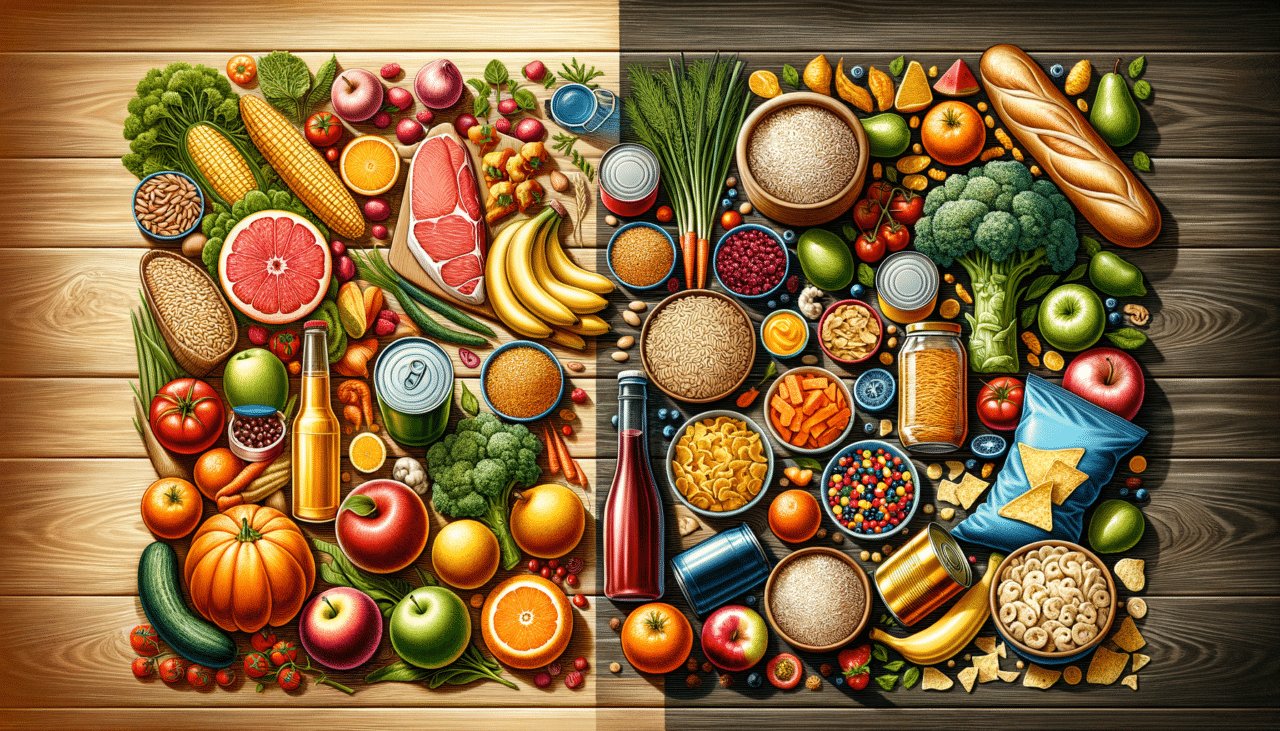Introduction
In the quest for optimal health and wellness, the debate between a Natural Foods Diet and a Processed Foods Diet is ever-present. As more people become health-conscious, understanding the differences between these two dietary approaches is crucial. In this article, we will delve into the characteristics of each diet and present a detailed comparative table to help you make an informed decision. Whether you’re looking to enhance your lifestyle or seeking to understand the implications of your dietary choices, this guide is tailored for you.
Characteristics of a Natural Foods Diet
-
Whole and Unrefined: At its core, a Natural Foods Diet emphasizes whole, unrefined foods. This includes fresh fruits, vegetables, whole grains, nuts, seeds, and lean proteins. These foods are minimally processed and free from artificial additives.
-
Nutrient-Rich: Natural foods are packed with essential nutrients, vitamins, and minerals. They are rich in fiber, antioxidants, and healthy fats, which are beneficial for overall health.
-
Low in Added Sugars and Sodium: By focusing on natural ingredients, this diet typically contains low levels of added sugars and sodium, reducing the risk of chronic diseases such as obesity, diabetes, and hypertension.
-
Supports Sustainable Practices: Many proponents of a Natural Foods Diet advocate for organic and locally-sourced produce, which supports sustainable agricultural practices and reduces the carbon footprint.
-
Promotes Healthy Digestion: The high fiber content in natural foods aids in digestion and helps maintain a healthy gut microbiome.
Characteristics of a Processed Foods Diet
-
Convenience and Accessibility: Processed foods are known for their convenience. They are easy to prepare, widely available, and often have a longer shelf life, making them a popular choice for busy lifestyles.
-
Variety and Flavor: This diet offers a wide array of flavors and textures, often enhanced by additives, preservatives, and artificial flavorings to make them more appealing.
-
High in Added Sugars and Sodium: Processed foods often contain high levels of added sugars, sodium, and unhealthy fats, which can contribute to health issues if consumed in excess.
-
Nutrient-Poor: Many processed foods are stripped of essential nutrients during manufacturing, leading to “empty calories” that provide little nutritional value.
-
Linked to Health Risks: A diet high in processed foods has been linked to various health problems, including obesity, heart disease, and metabolic syndrome.
Comparative Table: Natural Foods Diet vs. Processed Foods Diet
| Aspect | Natural Foods Diet | Processed Foods Diet |
|---|---|---|
| Food Source | Whole, unrefined foods | Packaged and manufactured foods |
| Nutritional Content | High in nutrients, fiber, and healthy fats | Often low in nutrients; high in sugars, sodium, and unhealthy fats |
| Health Benefits | Supports weight management, heart health, and digestion | May contribute to weight gain and chronic diseases |
| Additives and Preservatives | Minimal to none | Often contains artificial additives and preservatives |
| Environmental Impact | Supports sustainability and local farming | Typically associated with higher environmental costs |
| Cost | May be higher due to organic options | Generally more affordable and budget-friendly |
| Ease of Preparation | Requires more preparation time | Quick and easy to prepare |
Conclusion
Choosing between a Natural Foods Diet and a Processed Foods Diet largely depends on individual health goals, lifestyle preferences, and values. While natural foods offer a plethora of health benefits and align with sustainable practices, processed foods provide convenience and variety. Striking a balance by incorporating more natural foods while moderating processed food intake could be the key to a healthier lifestyle. As always, consult with a healthcare professional or nutritionist to tailor a diet that best suits your needs.
SEO Keywords: Natural Foods Diet, Processed Foods Diet, health benefits, nutrition, whole foods, artificial additives, dietary comparison, sustainable practices, health-conscious choices, gut health.

Comments (0)
There are no comments here yet, you can be the first!